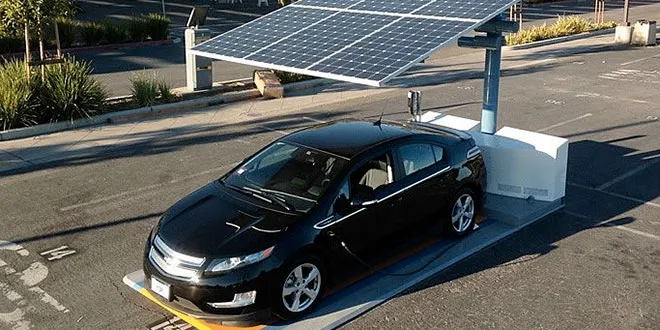In the quest for sustainable and eco-friendly transportation, the marriage of solar power and electric vehicles has emerged as a game-changer. With the growing popularity of electric cars, the concept of a “Solar System for Electric Cars” has gained traction, promising not only cleaner energy but also increased efficiency. Join us as we delve into the innovative realm of solar-powered electric cars, uncovering the advantages and considerations associated with this groundbreaking technology.
Solar System for Electric Car: Harnessing the Power of the Sun
Understanding the Integration
The idea behind a Solar System for Electric Cars is to harness solar energy through photovoltaic (PV) panels and convert it into electric power to charge the vehicle’s battery. This innovative approach aims to reduce dependency on traditional electrical grids and further diminish the environmental impact of electric car usage.
The Components of a Solar System for Electric Cars
- Photovoltaic Panels: These solar panels, typically mounted on the car’s roof or exterior surfaces, capture sunlight and convert it into electrical energy.
- Charge Controller: The charge controller regulates the flow of energy from the solar panels to the car’s battery, ensuring optimal charging conditions and preventing overcharging.
- Battery Storage: The energy generated by the solar panels is stored in a battery, providing a reserve of power for the electric car, especially during periods of low sunlight.
- Inverter: The inverter converts the direct current (DC) generated by the solar panels into alternating current (AC), which is used to charge the electric car’s battery.
Advantages of Implementing a Solar System for Electric Cars
1. Sustainable Energy Source
One of the primary benefits of a Solar System for Electric Cars is its reliance on renewable energy from the sun. Solar power is abundant, free, and emits no greenhouse gases during the energy production process, contributing to a cleaner and greener environment.
2. Reduced Dependence on the Grid
Integrating a solar system lessens the dependence on traditional electrical grids. Electric car owners can charge their vehicles directly from the sun, reducing the strain on conventional power sources and minimizing the carbon footprint associated with electricity generation.
3. Increased Driving Range
The additional energy generated by the solar panels contributes to an increased driving range for electric cars. While not sufficient to power the vehicle entirely, the solar system provides a supplemental source of energy, extending the distance electric cars can travel on a single charge.
Considerations and Challenges
1. Limited Charging Capacity
While a Solar System for Electric Cars offers additional energy, it may not provide a complete charge for the vehicle, especially during cloudy days or nighttime. Therefore, owners may still need to utilize conventional charging methods for a full battery.
2. Aesthetics and Design Challenges
Integrating solar panels into the design of electric cars poses challenges related to aesthetics and aerodynamics. Striking a balance between efficiency and maintaining the vehicle’s sleek appearance is crucial for widespread adoption.
Future Innovations in Solar-Powered Electric Cars
1. Advanced Solar Technologies
Ongoing research and development in solar technology aim to enhance the efficiency and effectiveness of solar panels. Innovations such as transparent solar cells and lightweight, flexible panels could address current limitations and improve the integration of solar systems in electric cars.
2. Collaboration and Industry Adoption
As the technology matures, collaboration between automakers and solar technology providers is crucial for the widespread adoption of Solar Systems for Electric Cars. Joint efforts can lead to standardized solutions and increased affordability for consumers.
Read too: Who Installs Electric Car Chargers and Why It Matters for Your EV? Unveiling the Experts
Conclusion: Driving Towards a Sustainable Future
In conclusion, the integration of a Solar System for Electric Cars represents a significant step towards a more sustainable and eco-friendly transportation future. While challenges exist, advancements in technology and growing environmental awareness are propelling the adoption of solar-powered electric cars. As the automotive industry continues to evolve, the synergy between solar energy and electric vehicles holds the promise of cleaner, greener, and more efficient transportation.
